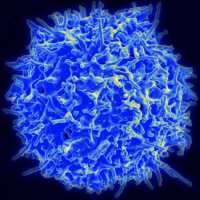The Cancer Survivors Network (CSN) is a peer support community for cancer patients, survivors, caregivers, families, and friends! CSN is a safe place to connect with others who share your interests and experiences.
Clinical Trials - some general questions

I'd like to make sure I understand the concept of clinical trials correctly.
- when a clinical trial is available, the whole point of it is to test a newer or emerging therapy or treatment that may or may not be better than 'traditional' or established treatments, is that correct?
- their might necessarily be increased or unknown risks simply do to the fact it hasn't been tested extensively or widely utilized, correct?
- when people are deciding whether to participate in a clinical trial or not, do the doctors discuss the options in detail and do the patients always have the choice?
- if you do participate, you never know if you were in a control or placebo group? If you are in a control group, while you might be helping other patients and society in general, you might miss out on any benefits or problems/side effects from the newer therapy.
- does anyone know how often people opt to be in a clinical trial? On the one hand it would seem very alluring to have access to the newest/possibly better treatment- but is it ever detrimental?
- to anyone who has participated in a clinical trial, I would love to hear any thoughts or comments you would be willing to share.
Comments
-
Many questions! Well…
- Trial drugs already have perhaps a billion dollars invested, so between laboratory and animal testing, they are reasonably certain that some will benefit from it.
2. If short term effects are unacceptable, you may simply withdraw and receive standard therapy. I asked my hematologist about the long-term effects of a certain drug. He replied "You'll tell us!"
3. You always have the choice. Do some digging ahead of time so that you have the right questions to ask.
4. Placebos are almost never used in cancer trials. You will almost always receive either experimental or standard therapy.
5. There is much trepidation surrounding clinical trials, but there are both qualifying and disqualifying factors regarding the patient. You have to qualify and not be disqualified. As to frequency and percentage of patients, your treatment facility probably has stats on that.
6. I have been in 4 clinical trials. I am alive because of one of them. I was removed from another due to disease progression. Two others I received no benefit and withdrew. Progress is made only via clinical trials. For example, Tylenol went through trials. I am big on trials, as you have the potential to receive drugs years ahead of the general public. I am a big proponent of trials.
-
-
I would like to piggyback on this thread. How do you discover applicable clinical trials? Po18guy, since you have done clinical trials before… Does your local oncologist recommend them? Do your big cancer center specialists recommend them? Or are you supposed to research for yourself? (When I called Mayo, they asked me if I was interested in clinical trials. When I said, "possibly", they asked if there was a specific one I was interested in.) If I am supposed to research for myself, where do you go to find information on that kind of thing? Pretty overwhelmed with how much I am supposed to just know/figure out seemingly on my own. And I love my local oncologist.
-
-
From my experience: first, it is an excellent sign if your facility conducts clinical trials. The information gained can direct doctor between trials and perhaps several other standard therapies.
Locally: I would advise you to first consider the trials offered at your facility, which are likely offered on their website. Doctor will probably be able to determine which might be appropriate for you, given your diagnosis and health status. There will be advantages and disadvantages in both trials as well as standard therapy. Response is not guaranteed in either case. It is good to remember that there are alternative standard regimens, even if the most effective therapies fail. You can both stop standard therapy and consider a trial, as well as leave a trial and receive standard therapy - which is always an option.
Regional: if there is nothing locally, you can balance the need for a trial versus receiving standard therapy locally. There are no easy answers here and each decision will require discussion and pondering. As to regional or nationwide trials, Clinical trials.gov is the official website. On that page, you enter your diagnosis and a bewildering number of trials will pop up. However, there is a search box on the left of the page to narrow the search by location as to city, state etc. That will greatly reduce the number of potential trials.
In using the national website, first have a look at those trials which fit your diagnosis. Peruse those which are local, which could mean at a different facility in your same city or state. If you can travel to another facility, perhaps consider trials there. If you travel, you will still need to consult with a hematologist there to see if that trial is appropriate.
On the national website, in each trial there is a colored status box. Red indicates the trial is completed/closed, and green indicates that the trial is actively recruiting. Have a look at the inclusion factors as well as the exclusion factors. If you seem to be a good fit, then messaging your team to determine if a particular trial is appropriate to consider, as there may be a molecular aspect of your diagnosis which might not respond, or there may be concerns about a particular aspect of your health (blood pressure, diabetes, etc.) that may raise concern.
In general: Trials have different phases, normally 1-3, and some will then enter a long-term study. A phase three trial has been in progress for a longer time and will have much more data to consider, such as response rates, side effects etc. If you drop out or are removed from a particular trial, you may still qualify for another - but exclusions are then probably more restrictive.
Costs: all trial-related procedures, scanning and therapy/drugs, etc, are covered by the sponsoring drug company. You or your insurance pay only for the "standard of care" which is the bsasic medical care you would receive in any case.
Decisions: Few are easily made. Often choosing one treatment or trial will eliminate the others. As well, once you have undergone that therapy, there is no way of knowing if it was the best. All must be judged by your response to therapy, balanced against the potential harm the therapy might cause. Each decision will feel like crossing a "bridge of sighs" but you are making informed choices. Ask many questions. Write your questions down ahead of time, as doctor visits are not the best time to recall a question you might have had. Answers are better than worries.
To distill this, the primary questions after locating a clinical trial are whether or not it is offered locally, if your condition is a good fit, if the data collected so far is encouraging and if your doctor agrees that it will offer an advantage over standard therapy. NEVER worry about potentially offending your doctor. It is YOUR life, not theirs!
-
-
Discussion Boards
- All Discussion Boards
- 6 Cancer Survivors Network Information
- 6 Welcome to CSN
- 122.7K Cancer specific
- 2.8K Anal Cancer
- 457 Bladder Cancer
- 313 Bone Cancers
- 1.7K Brain Cancer
- 28.6K Breast Cancer
- 407 Childhood Cancers
- 28K Colorectal Cancer
- 4.6K Esophageal Cancer
- 1.2K Gynecological Cancers (other than ovarian and uterine)
- 13.1K Head and Neck Cancer
- 6.4K Kidney Cancer
- 685 Leukemia
- 805 Liver Cancer
- 4.2K Lung Cancer
- 5.1K Lymphoma (Hodgkin and Non-Hodgkin)
- 243 Multiple Myeloma
- 7.2K Ovarian Cancer
- 72 Pancreatic Cancer
- 494 Peritoneal Cancer
- 5.7K Prostate Cancer
- 1.2K Rare and Other Cancers
- 544 Sarcoma
- 744 Skin Cancer
- 662 Stomach Cancer
- 194 Testicular Cancer
- 1.5K Thyroid Cancer
- 5.9K Uterine/Endometrial Cancer
- 6.4K Lifestyle Discussion Boards
